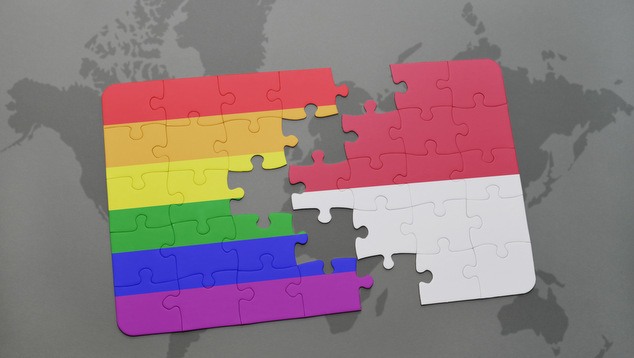
LGBTI rights activists have expressed alarm at a bill being considered by the Indonesian parliament. The proposal calls for LGBT people to report to authorities for rehabilitation.
A draft “family resilience” bill has been proposed by members of the House of Representatives of Indonesia. The draft law defines homosexuality as a deviance which poses a threat to families, and requires LGBTQ people to report to authorities for rehabilitation, and their families to report LGBTIQ people to agencies handling “family resilience”.
The draft law, seen by Jakarta Post on Wednesday outlines the formation of a state body responsible for “family resilience” which would handle “family crises due to sexual deviation” through spiritual guidance and social, psychological and medical rehabilitation.
LGBTI rights advocates from OutRight Action International say the proposed law is the latest development in an increasingly hostile situation for LGBTQ people; government targeting and vigilante violence against LGBTQ people has steadily intensified over the last 5 years.
Indonesia does not criminalize same-sex relations on a national level, however Sharia law, which outlaws same-sex relations, is in effect in the provinces of Aceh and West Sumatra. The national Pornography Act, which is vaguely worded and thus open to wide interpretation, is widely used to target LGBTQ people, and in 2018 a national law criminalizing same-sex relations was proposed, but has not yet been passed.
Jessica Stern, Executive Director of OutRight Action International,says the latest proposal from Indonesia is very concerning.
“The news from Indonesia is extremely concerning. The draft bill proposes to codify in law that LGBTQ people pose a threat to their families and need to be ‘rehabilitated’, changed, and removed – in essence requiring LGBTQ people by law to undergo so-called conversion therapy practices which are deemed by reputable psychiatric institutions, such as the World Psychiatric Association, as harmful and ineffective.
“This not only intensifies the mounting persecution and hate LGBTQ people already face, but also requires their families to report them, making LGBTQ people even more vulnerable and isolated.”
Activists say the proposal puts Indonesia inline with countries like Nigeria, Brunei and Egypt who have, or are considering, harsh laws against homosexuality.
“The introduction of criminalisation laws where none have existed, and further criminalisation in countries which already criminalize same-sex relations, is a frightening reminder of a growing global backlash against gender equality and the right of LGBTQ people to be who we are and love who we choose, without fear of violence, persecution or imprisonment.” Stern said. “This should serve as a reminder that progress cannot be taken for granted, and LGBTQ movements have to fight not only for progress, but also against regression.”
The Indonesian bill calls for centres for rehabilitation of gay, lesbian, transgender and bisexual people to be set up across the country. It also proposes authorities be compelled to take action against “non physical threats to families”. It identifies these non-physical threats as anything which promotes, individualism or secularism and casual sex propaganda, as well as lesbian, gay, bisexual and transgender [LGBT] propaganda.
Gerindra Party member Sodik Mujahid told the Jakarta Post that homosexuality ‘disrupts the future of mankind’ and said the bill was inline with Indonesian values.
The bill also creates legislation stating that wives should “take care of household-related matters” and “treat the husband and the child well.”
The proposed legislation lists being LGBT alongside incest and sadomasochism, and also tackles surrogacy by proposing a seven year jail sentence for anyone involved in the practice.
LGBTI rights activists are not the only group raising concern about the proposed legislation, Amnesty International have also raised concern about how the bill defines the role of women.
“It’s a very patriarchal bill and it will set back progress in gender equality and women’s rights protection,” Usman Hamid of Amnesty International Indonesia told Reuters.
OIP Staff






